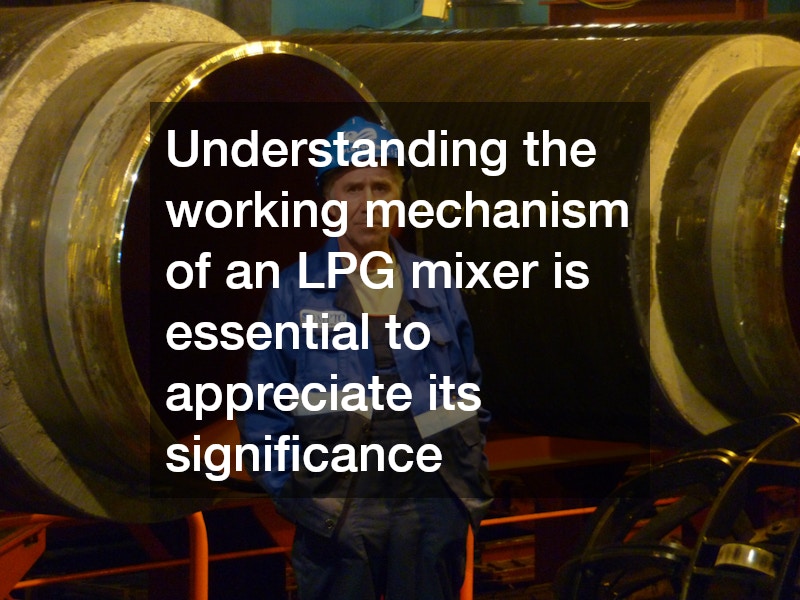LPG mixers play a crucial role in the efficient use and distribution of liquefied petroleum gas (LPG). These devices are essential in blending LPG with air or other gases to create a suitable mixture for various applications. This blending process helps ensure the smooth and safe operation of equipment that relies on LPG for energy.
LPG, used extensively for both industrial and domestic purposes, provides a clean and efficient energy source. However, the correct mixture must be maintained to prevent issues such as incomplete combustion, which can lead to hazardous emissions. By using an LPG mixer, industries and households alike can benefit from optimized fuel consumption and reduced environmental impact.
In this article, we will delve into the specific uses of LPG mixers, their importance, and the various sectors where they find applications. From powering appliances to fueling vehicles, these mixers hold the key to maximizing the effectiveness of LPG while ensuring safety and efficiency. As we explore further, the critical role that LPG mixers play in modern energy landscapes becomes increasingly apparent.
How LPG Mixers Work
Understanding the working mechanism of an LPG mixer is essential to appreciate its significance in various applications. Essentially, an LPG mixer combines a measured amount of air with LPG to create a consistent and controlled gas mixture. The purpose of this blending is to enhance combustion properties, ensuring that the gas burns efficiently and safely.
The mixer typically features components like injectors and valves that regulate the flow of LPG and air. By adjusting these elements, users can fine-tune the mixture to match specific requirements. This adaptability makes LPG mixers invaluable across industries where precise gas composition is crucial for both performance and safety.
A well-designed LPG mixer improves combustion quality, reduces the risk of carbon monoxide emissions, and prevents energy loss. In addition, it allows for greater control over the energy output, enabling more efficient use of LPG as a resource. By providing this level of customization and control, LPG mixers are indispensable tools in various settings.
Industrial Applications of LPG Mixers
In the industrial sector, LPG mixers are integral to operations that demand high energy outputs and fuel efficiency. They are instrumental in industries such as metalworking, where furnaces and kilns require precise temperature control for optimal performance. LPG mixers ensure that the gas mixture fed into these systems is balanced, promoting uniform heat distribution.
Additionally, LPG mixers are used in manufacturing processes requiring precise heating, such as glass production and textiles. The ability to maintain consistent combustion temperatures is critical in these industries to avoid defects and maximize product quality. Furthermore, mixers help industrial facilities adhere to environmental regulations by minimizing emissions through efficient fuel burning.
Another significant industrial application is in the generation of electricity, where LPG can be a cost-effective and cleaner-burning alternative to other fossil fuels. LPG mixers play a vital role in optimizing this use by ensuring that the fuel mixture meets stringent performance standards. The efficiency gains from using LPG mixers translate into reduced operational costs and a smaller carbon footprint, aligning with sustainability goals.
Commercial and Residential Uses of LPG Mixers
Away from heavy industries, LPG mixers find numerous applications in commercial and residential settings as well. Restaurants, bakeries, and other food service facilities use LPG mixers to power ovens and stovetops. These appliances rely on a steady and controllable flame to produce consistent cooking results, which mixers help achieve by maintaining the right gas mixture.
In residential applications, LPG mixers are employed in central heating systems and water heaters to improve efficiency and safety. By optimizing the air-to-gas ratio, these mixers enhance appliance performance, leading to more cost-effective and energy-efficient heating solutions. The safety provided by using a properly mixed LPG system cannot be overstated, as it significantly reduces the risk of leaks and accidents.
LPG mixers also play a role in enhancing the effectiveness of LPG-fueled vehicles. By supplying engines with an efficient air-gas blend, mixers help improve engine performance and fuel economy. This makes LPG a viable option for reducing transportation emissions, further underlining the versatility of LPG mixers across different uses.
The Future of LPG Mixers
As the demand for cleaner, more efficient energy sources grows, LPG mixers are poised to become even more critical. Innovations in mixer technology promise to deliver enhanced performance characteristics, supporting the transition to more sustainable energy systems. Researchers and manufacturers are working to develop advanced materials and designs that maintain efficiency while expanding capabilities.
The shift towards renewable energy has also sparked interest in hybrid systems combining LPG with other energy sources like solar or electric power. In such systems, mixers will play a pivotal role in optimizing energy use, ensuring that all components work seamlessly together. By improving integration with modern energy technologies, LPG mixers can extend their utility further into eco-friendly landscapes.
Ultimately, the continued evolution of LPG mixer technology has the potential to significantly impact energy consumption patterns and environmental outcomes. By making LPG use more efficient and sustainable, mixers will contribute to broader efforts to reduce carbon emissions and transition to greener energy practices. As this journey unfolds, LPG mixers will remain vital instruments in energy management.

